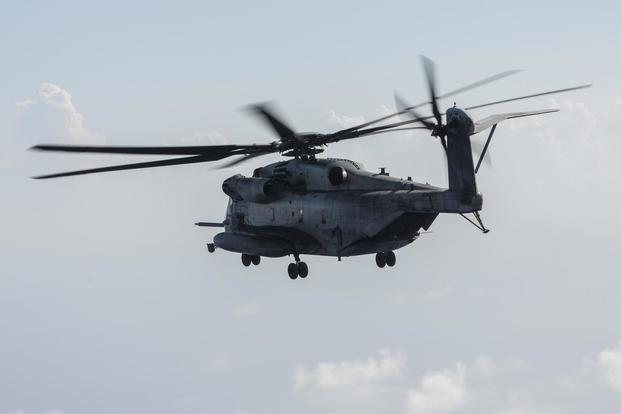The Marine Corps is investigating after yet another incident involving U.S. military aircraft in Japan, this one featuring a 17-pound window that fell to earth from a heavy-lift helicopter and caused a young boy's arm to be injured.
Kyodo News first reported Wednesday that the window fell from a CH-53E Super Stallion and landed near Daini Futenma Elementary School, kicking up gravel that hit one boy in the arm and frightening dozens of children nearby.
In a statement, officials with III Marine Expeditionary Force in the Pacific confirmed that the incident had taken place around 10 a.m. local time. The Super Stallion had then immediately returned to the adjacent Marine Corps Air Station Futenma and reported what happened, officials said.
"This is a regrettable incident and we apologize for any anxiety it has caused the community," officials said in the statement.
Related content:
- Okinawans Protest After Day Care Center Hit by Likely US Aircraft Part
- Marines Pause CH-53 Flights in Okinawa After In-Flight Fire
- Emergency Landing as Marine Super Stallion Catches Fire Over Okinawa
An investigation is underway, and the Marines are working with local authorities to determine what happened. The command warned members of the community to stay away from the site where the window landed to avoid disturbing the investigation.
The incident comes just a week after a "small cylindrical object" reportedly fell from a military helicopter onto the roof of a kindergarten in Okinawa, a stone's throw from the air station.
The Japanese newspaper Kyodo News reported that all Super Stallions at MCAS Futenma have been grounded so that safety checks can be conducted.
Okinawa Gov. Takeshi Onaga, who has long been critical of the large Marine Corps presence in Okinawa, and particularly of risks Marine aviation poses to the local community, told reporters that having an aircraft piece fall in a playground was "unforgivable."
"The safety of children should come first," Onaga said, according to the Kyodo News report.
Kyodo also reported that the Corps initially denied the window had fallen off during flight.
It has been only three months since the Oct. 11 emergency landing of another CH-53E Super Stallion, which put down in a private field near Okinawa's Northern Training Area after catching fire during a training flight.
That incident, which required a multi-day recovery and removal effort for the damaged aircraft, prompted a five-day operational pause for all Super Stallions in Okinawa.
The cause of that incident has not yet been made public.
Super Stallions, used by the Marine Corps across the globe for troop transport and moving gear, have been called the hardest-worn of any service aircraft in combat in Iraq and Afghanistan.
They are due to be replaced by the brand-new CH-53K King Stallion, with introduction of the new helicopter set to begin as soon as next year.
-- Hope Hodge Seck can be reached at hope.seck@military.com. Follow her on Twitter at @HopeSeck.














